|
Gayana Island, Sabah -
Paradise in the Wilderness
By
Rosli Abidin Yahya
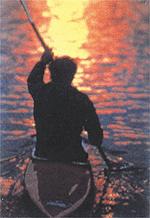
Kayaking at sunset.
|
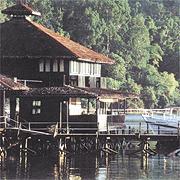 One of the chalets.
One of the chalets.
|
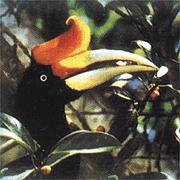 Beautiful fauna.
Beautiful fauna.
|
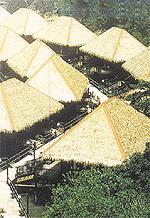
View of the chalets from the top.
|
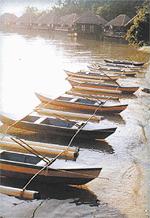
Boats available for kayaking.
|
Gayana Island EcoResort in Pulau Gaya, near Kota Kinabalu, Sabah is the
brainchild of Datuk Joseph Ambrose Lee, a well-known businessman in Malaysia who also owns
a fast food chain, Sugar Bun in Borneo.
The desire to rehabilitate marine life, his main wish to see people love
the nature and his overwhelming dream to see tourists coming in are temptations that he
could not resist for so long. He developed Pulau Gaya into a resort area for people to
come and rest, for scuba divers to swim and see with their own eyes the beauty of coral
reefs as well for marine researchers to initiate research on marine life.
"I came to the island one day to see with my own eyes and looked at
the problems associated with the island. I saw marine life and corals were destroyed by
greedy fishermen who used bomb to catch the fish. I saw pollution all over the island and
I saw squatters and illegal immigrants there.
"I came back to Kota Kinabalu and said to myself that I will develop
the island into a beautiful place for people of all life to flock to the island for a
number of reasons," he told Sunday Bulletin in Sabah last month.
That was many years ago and today, Pulau Gaya has a resort hotel as well as
plenty of activities for the visitors, not only from foreign countries like Brunei, Middle
East and Europe but more importantly the island has now become a favourite get-away for
the people of Sabah too. Even the Malaysian Prime Minister, Datuk Seri Dr Mahathir Mohamad
prefers to stay there if he comes to Sabah for a visit.
The hotel, Gayana Island EcoResort is actually nested into the lush
tropical wildness of the National Park of Tunku Abdul Rahman. The island is famous for its
ancient, dense Dipterocarp forest and it offers a rare glimpse into a primordial jungle.
Caressed by the gently, lapping of the South China Sea, visitors will come to an
understanding of the fragility of perfection.
Pulau Gaya is just a leisurely 30 minutes ferry ride from the vibrant,
modern and hectic city of Kota Kinabalu and the island presents an overture of majestic
rainforest as well as the watery glory of the South China Sea. It has a horde of
activities for the visitors to linger away their time such as multi-day kayaking, hiking,
scuba diving trips, snorkelling in the turquoise sea or even splashing in the natural
water pool.
In the evening visitors can request for environmental lectures by the
resort's marine biologist or forest ecologist. Your evening can be a colourful and
authentic cultural dances from the multi-variety people of Sabah including the Brunei
Malays. Or you can just sit back and relax, have a tropical drink and ponder the setting
sun reconstructing the forest into a kaleidoscope of shadows and colours.
Gayana Island EcoResort has 44 quaint chalets, seafood restaurant, reef
rehabilitation research centre, environmental interpretation centre and a beachside bar.
It also offers the visitors the unspoiled ambience of island life in such splendid,
tantalising and enlightening style.
For all that matters, you can also sit on your private deck and listen to
the squacking of the hornbill, watch the soaring of the magnificent sea hawk or scrutiny
the flurry life of marine animals swimming beneath you.
"People always asked me how I can get rid of the refugees and illegal
immigrants on the island. Yes, the Sabah Government managed to do that. Then people again
asked me how could I get rid of the rubbish that had become a part of their culture.
"Well, we advise, educate and lecture them that if the island is kept
clean, visitors will not mind coming to your house. Then they say why would they visit
their houses. We tell them you can start a roving handicraft business or you can show them
your ability and we will charge the visitors and give you the money.
"It takes a long time to do it but we will achieve that in three
months time," said a smiling Datuk Ambrose.
It is definitely not easy to change the way of life of the island people.
Over the years the island had accumulated enough rubbish as well as pollution by raw
sewage released into the natural habitat.
The surrounding sea had been for years the natural garbage disposal area,
which saw immense destruction of marine life such as the corals. Shifting cultivation had
also showed its destructiveness and so was illegal logging that flattened the primary
jungle of the island. The river was polluted and filled with plastic bags and rubbish.
"In a way we were lucky because the river is not polluted with
chemicals and toxic materials."
Source: Borneo Bulletin Sunday
Sabah
Tour Packages
BACK
TO LEISURE PAGE
|
